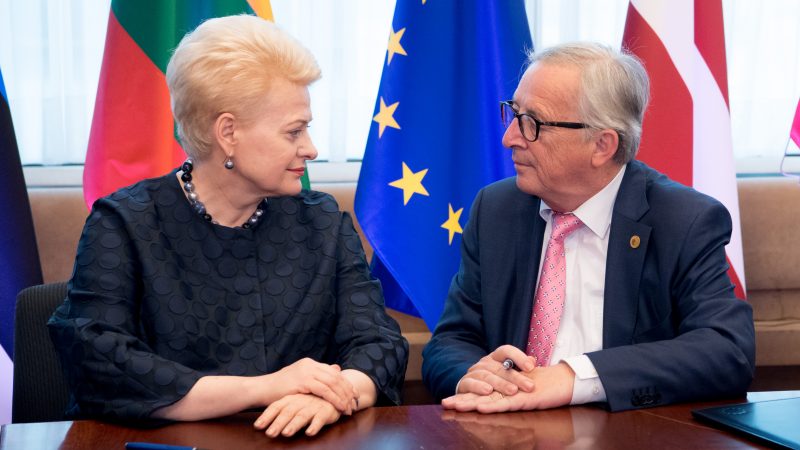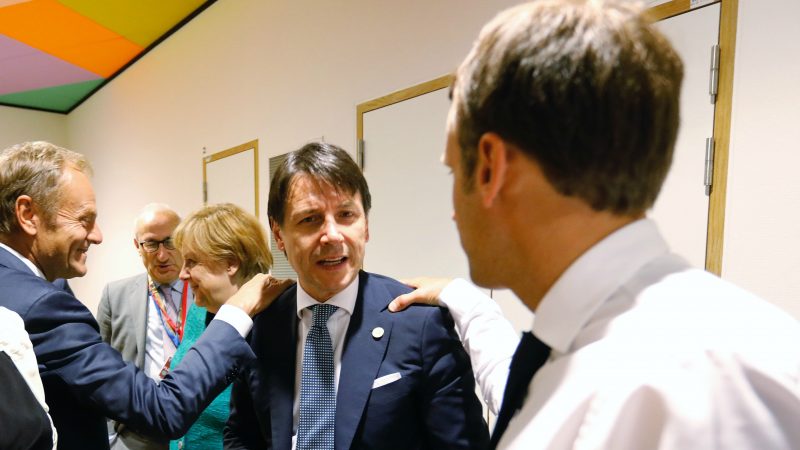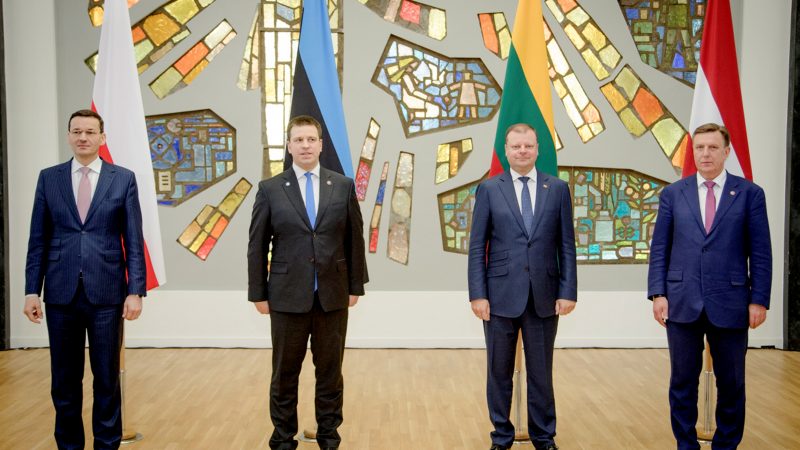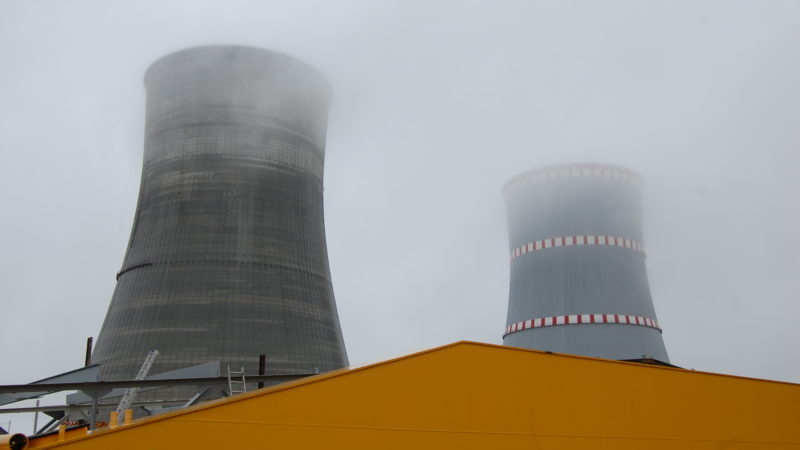
Lithuanian President Dalia Grybauskaité during the signing ceremony with Commission boss Jean-Claude Juncker. [European Commission]
“European Summit: small victory for the V4”
Visigrad Post, 30 June 2018:
On Thursday 28 and Friday 29 of June the leaders of the 28 Member States of the European Union met in Brussels for a summit to discuss in particular migration policy at a European scale. A summit that has brought some progress but which is not a decisive victory for anyone, even if the V4 can celebrate having imposed its themes and some of its solutions, as well as having overcome the domination of the immigrationist paradigm.
Belgium, Brussels – Once again, the European Union seems to be paralyzed. The leaders of the 28 EU Member States, however, all wanted to move the debate on the migration issue forward, and the discussions dragged on late into the night. Nothing helps, the migration issue is not settled, and no idea is unanimous.
The Hungarian Prime Minister represented the Visegrád countries during the V4-France meeting preceding the summit, in order to negotiate with Emmanuel Macron. The immigrationist governments, like those of the French Republic or Germany, have agreed to abandon the idea of mandatory quotas for all, which is already a great victory for Viktor Orbán and V4. For the strong man of Budapest, who announced on his arrival in Brussels his willingness to put an end to massive and uncontrolled immigration to Europe and initiate remigration, the summit can not however be seen as a total victory.
Certainly, the EU is starting to be in tune with the solution proposed by the V4 three years ago, namely the setting up of refugee camps outside the EU borders – to make the registration of applications and to distinguish refugees from cheaters and economic migrants – and Frontex control over the Mediterranean Sea. But if we do not know the exact content of the negotiations, we understand that each side had to make concessions.
Quotas will only apply to Member States wishing to participate in the relocation of immigrants, but those who oppose it may well be required to participate more heavily in the funding of protection structures. Frontex should indeed significantly increase its workforce in the coming years, and that will have a cost. Slovak Prime Minister Peter Pellegrini announced that Slovakia was volunteering to temporarily accommodate 1,200 migrants to relieve neighboring countries – referring to Austria. He insisted, however, that every migrant should be accepted by the government, and that none of them could enter and stay in Slovakia without prior government control and acceptance.
No details on the technical solutions: the EU is talking about increasing aid to the countries of origin of the migrants, but the population of these countries is expected to double by 2050. And what about the migrants which will be refused in the registration camps? Many questions still arise.
A concrete progress for the Visegrád group, certainly because of the Italian pressure on the issue, is that NGOs should now stop picking up in the Libyan territorial waters migrants on smugglers’ ships, and let the Libyan coastguard do their work. This should considerably dry up the massive influx of illegal immigrants into Italy, and therefore into Europe.
So if the V4 has managed to establish itself as a key and influential trading partner, it has not – yet? – obtained total gain of cause. The fight within the EU on the migration issue has not been resolved this week.
Euractiv, “EU summit approves tortured conclusions on migration after sleepless night”, 29 June 2018:
EU leaders reached a much-needed deal on steps to tackle migration after resolving a bitter row with Italy’s inexperienced prime minister. Extended talks lasted through the night and only wrapped up on Friday morning (29 June).
Europe’s leaders got the bitter taste of what anti-system diplomacy, or creative disruption means. Prime Minister Giuseppe Conte, who heads Italy’s month-old populist and anti-immigration government, took the entire summit as hostage.
Conte blocked the summit conclusions in a bid to get his reluctant counterparts to share responsibility for asylum seekers landing on Italian shores.
A summit ending without conclusions would have been a political disaster with unpredictable negative consequences for the EU bloc, so the stakes were high

A relieved Merkel in backround as an agitated Conte gets a pat on the back from Tusk and Macron
Disruptive diplomacy
Former law professor Conte, until recently a virtual political unknown, came to Brussels emboldened by the announcement of an upcoming visit to Washington to visit US President Donald Trump, who has hailed Rome’s tough stance, and who himself blocked the conclusions of a recent G7 leaders meeting on trade.
The summit which is expected to end today by noon, was called the “mother of all summits”, in particular because of the potential impact on the political future of German Chancellor Angela Merkel, who is wrestling to preserve her fragile government at home.
“Europe has many challenges but migration could end up determining Europe’s destiny,” Merkel told German lawmakers hours ahead of the summit.
There are very few migrants arriving in Germany recently but Merkel’s conservative CSU ally warned it would send back migrants who reach the German border after having registered in other EU states.
Such a move could see a domino effect of re-introduction of internal borders and the collapse of the Schengen area.
In contrast, Italy is actually under migratory pressure from the Central Mediterranean route with significant numbers of arrivals salvaged at sea and brought to its ports. Since the new government took over, Italy has refused to let several migrant rescue boats dock at Italian ports, reopening EU divisions.
“Italy does not need more words, but concrete actions,” Conte told reporters as he arrived at the summit, adding that if EU leaders did not offer more help “we will not have shared conclusions”. Italy wants the responsibility for migrants on ships arriving on its shores to be shared out across the 28-nation European Union.
Drama at summit
European Council spokesman Preben Aamann said that after several hours of talks, conclusions on all issues from the summit – which is also dealing with trade and defence in addition to the core subject of migration – had been blocked.
“Nothing is agreed until everything is agreed,” an Italian source added.
Other sources said the other 27 EU leaders were “astonished” and unhappy over Italy hardening its position and that “it was a very virulent discussion and everyone jumped on the Italian”.
Euractiv, “The Roundup”, 29 June 2018:
The ‘mother of all summits’ wrapped up earlier. Check out how it all unfolded here. It was all supposed to be about unity but there wasn’t even a family photo, in what seems like a new tradition.
Jean-Claude Juncker was in full House of Cards mode about his upcoming trip to Washington to try and avert an all-out trade war. Conclusions on the eurozone were, as expected, the bare minimum.
Brexit barely got a mention, except on “insufficient progress”. Emmanuel Macron has lost patience and wants a final withdrawal deal done by the autumn. British actor and repentant Leave voter Danny Dyer summed up ex-PM David Cameron’s role in one moment of genius.
One overlooked result of the summit was an agreement between the Baltics, Poland and the Commission on decoupling Estonia, Latvia and Lithuania from Russia’s power grid and sphere of influence.
Euractiv, “EU, Baltics, Poland target Russia grid separation by 2025”, 29 June 2018:
The Baltic nations, Poland and the European Commission agreed Thursday (28 June) on a roadmap to synchronise the region’s electricity network with the rest of continental Europe’s by 2025 and end their reliance on the Russian grid.
The leaders of Estonia, Latvia, Lithuania, Poland and the European Commission all signed up to a political agreement during a special ceremony on the sidelines of the ongoing European Council summit.
According to the roadmap, the deadline for concluding the synchronisation of the Baltic grid is set for 2025, using an existing electricity interconnector between Poland and Lithuania, as well as a planned undersea cable.
The latter project will only be undertaken if results of a study by the European Network of Transmission System Operators (ENTSO-E) show that it guarantees energy security, security of supply and if costs are within reason. Results due in September.
Commission chief Jean-Claude Juncker said that “since the beginning of our mandate, my Commission has been committed to having full integration of the Baltic states’ grids with the rest of Europe”.
Energy Union boss Maroš Šefčovič called the deal “solidarity at its best“, adding that the project will “cost us a lot from the European budget”, through the Connecting Europe Facility.
Poland’s role in the preliminary deal is crucial as it will act as the primary link between the Baltics and the rest of Europe. In March, the three countries revealed they would not support any EU sanctions against Warsaw as part of the ongoing rule of law spat with Brussels.

Polish Prime Minister Mateusz Morawiecki (L-R), Estonian Prime Minister Juris Ratas, Lithuanian Prime Minister Saulius Skvernelis, Latvia’s Prime Minister Maris Kucinskis during Prime Ministers Council of the Baltic Council of Ministers with Polish counterpart in Vilnius, Lithuania 9 Mar 2018. [EPA-EFE]
Latvia, Lithuania and Estonia have confirmed that they are against imposing EU sanctions on Poland for alleged breaches to the rule of law. EURACTIV Poland reports.
Thursday’s agreement was long overdue, after disputes about how best to cut ties with the Russian-Belorussian network stood in the way of any progress.
Estonia and Latvia initially both favoured setting up a second alternating current (AC) connection with Poland to complement the existing LitPol link but Lithuania and Poland did not support that idea, despite studies showing that two AC connections would be best.
Estonia had also suggested synchronising via the Nordic nations.
Instead, Estonia and Latvia agreed to an undersea direct current (DC) link between Lithuania and Poland, provided the results of the ENTSO-E study are acceptable.
Power games
All three Baltic countries are still synched with the Soviet-era BRELL energy network and remain dependent on that system, despite over a decade of EU membership.
Desynchronisation has become an important political issue for the countries’ leaders and earlier this month, Estonian PM Juri Ratas said that “separation of our electricity system from Russia and its integration into Europe will increase our security”.
But the chairman of the Estonian Academy of Sciences, Arvi Hamburg, told Finnish media that the plans are “a political project” and warned that taxpayers will incur additional costs with very little gain.
Indeed, Estonia is the least reliant on energy imports of any EU country and is already selling its surplus energy statistics to the highest bidder, whereas Latvia and Lithuania both bring in over 50% of their power needs.
Luxembourg buys up surplus energy to hit renewable target, in EU first
Lithuania and Luxembourg became the first EU member states to agree on the transfer of renewable energy statistics on Thursday (26 October), meaning the Grand Duchy will now probably hit its 2020 target. Estonia hopes to broker a similar deal to finance its wind power ambitions.
Desynchronisation is particularly pressing for Lithuania, which has long objected to an under-construction nuclear power plant on its border with Belarus and which President Dalia Grybauskaitė last year called a “Russian geopolitical project”.
Russia’s state-owned atomic energy company is building the Ostrovets facility within 50km of Lithuania’s capital, Vilnius, and the Baltic nation has repeatedly claimed that Belarus has ignored international safety standards. Minsk insists it has followed all protocols correctly.

The Ostrovets nuclear power plant takes shape and gradually emerges from the mists of northwest Belarus. [
Sam Morgan]
Belarus: Atomic power on the EU’s doorstep
A nuclear power plant on the EU’s border with Belarus continues to court controversy due to a number of incidents during its construction and serious concerns raised by neighbouring countries. EURACTIV.com visited the ex-Soviet nation in October to learn more.
Belarus hopes that the plant, which is due to start coming online next year, will help cut its reliance on Russian gas (currently around 95% annually), although it will exchange that particular dependence for an exclusive nuclear fuel contract with Moscow.
In addition to desynchronisation, Vilnius hopes that a 2017 law banning the purchase of Belarus energy and a Baltic-wide tax on imports will help mitigate the plant’s impact on its energy system.
